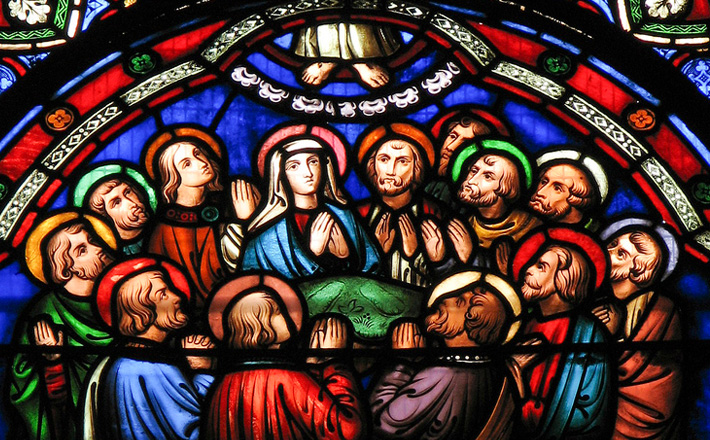Commentary on Acts 1:6-14
This is a funny sort of episode to kick off a book all about mission.
The founder tells his followers to spread the word across the entire face of the earth, but then he vanishes into the clouds, so the newly commissioned apostles just go back home, sit tight, and pray. Good luck with that, guys. (And girls: along with those “certain women,” we have here the last reference to Mary in the New Testament, other than Paul’s minimalistic “born of a woman” in Galatians 4.)
Furthermore, the question they ask — now will you restore the kingdom to Israel? — is proof that they still don’t get it, even after the resurrection. “Not getting it” is a distinguishing quality of Jesus’ disciples. Think of Peter’s constant stumbles, the disciples bickering about who is the greatest (not once but twice in Luke: chapters 9 and 22), or James and John asking to sit at Jesus’ left and right hands to demonstrate how well they’ve understood what he’s said about being mocked and flogged and spat upon.
So there’s been Jesus doing all this teaching, feeding, healing, dying, rising and raising, not to mention his relentless hammering on sin and the forgiveness thereof — and what the excitable apostles distill from it all is that now is the time for the restoration of the kingdom. Apparently, they missed the “my kingdom is not of this world” memo. (Perhaps because it was only circulated among John’s readership.)
This is not an error likely to be made by twenty-first-century, probably Gentile Christians with the long burden of church history trailing behind them. But Jesus’ response is as timely as ever: “It is not for you to know the times or periods that the Father has set by his own authority.”
Speculation as to the grand pattern of history, and our place in it, is a pastime venerable only because of its age. Augustine did about the best job that can possibly be done with it, employing (to use the terminology of a thousand years later) a theology-of-the-cross hermeneutic: the true city of God is hidden and suffering, and earthly glory is no proof of anything.
Most other efforts toward cracking the code of history have been pretty lousy. Eusebius wrote the first church history to vindicate the semi-Arian march of triumph toward the Constantinian establishment. It’s hard to see how the Christians of the time could interpret the end of the age of martyrdom as anything but God’s blessing; little did they know, however, the fatal compromises and collusion that would follow in the wake of political power aligning itself with ecclesiastical power. But then the end of that arrangement, as has been unfolding over the last five centuries or so, is hardly an unambiguous success, either.
And those are still only mild attempts to sort out the flux of history. Others have gone into excruciating detail in mapping out the epochs, based on Daniel or Revelation or the Trinity, from patristic chiliasts to Joachim of Fiore in the twelfth century to the Scofield Reference Bible in the twentieth. Even the eager affirmation of growing Christianity in the Global South serves a particular glorious narrative of history, assuaging fears and assuring hope — but still based on our knowing “the times or the periods.”
Whoever plays the game, it’s dangerous. It can’t not be self-serving, whether in triumphalist or paranoid ways. Claiming to know the pattern of history ultimately doesn’t commend faith in God but faith in one’s knowledge of the pattern. It encourages one to place oneself on the winning side of history, at whatever cost.
We’ve seen no end of regimes, theologies, churches, and governments claiming history on their side. It is all too common in U.S. political discourse, flip-flopping between messianic hopes and armageddon panic. Karl Marx thought he figured history out with communism, Francis Fukuyama with capitalism, and ISIS with the Islamic State. If history awards prizes to whoever manages to drain the most blood, then one (or more) of these theories may be right. Good reason to prefer a kingdom not of this world.
Jesus betrays no hints about history’s course. What he gives us — besides himself! — is now and eternally. Now: you don’t know the pattern, the times, or the periods. You don’t need to. What you need to do now is get going as witnesses to the good news about God breaking into history. Eternally: God’s justice will be wrought on all sin and evil, God’s mercy will be poured abroad, the body will be raised up to live in a city without temple or lamp where God is all in all.
Stirring words. Stirring enough to send the happy disciples right back to where they started, a familiar place, to pray and hang out. It’s not a bad start. It’s not enough, either. But they don’t know what to do without the Holy Spirit egging them on. A little Pentecost fire, a handy martyrdom of Stephen, and they’ll start on that long road to Judea, Samaria, and the ends of the earth. In God’s time, not theirs. It is enough.


May 28, 2017